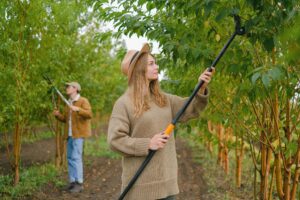Agricultural Worker Program Canada 2024
Agricultural Worker Program Canada 2024
Overview
The Seasonal Agricultural Worker Program (SAWP) allows employers to hire temporary foreign workers (TFW) when Canadians and permanent residents are unavailable.
For the Canada 2024 Agricultural Worker Seasonal Work Program: These employers must apply for a maximum of eight months from his January 1st to his December 15th date in a participating country within a period of at least six weeks.
Must provide employees with 240 hours of work.
TFW is available for rent.
Qualifications
: The required qualifications for the Canadian Seasonal Agricultural Worker Program 2024 are: To qualify for SAWP, an employer must meet her three criteria: Employees hired must be nationals of Mexico or a participating Caribbean country.
Production must take place in a specific raw material department.
Activities must be related to the holding’s primary agriculture.
Note: For his 2022 SAWP season, the SAWP work permit will grant him a 9 month work period instead of his normal 8 month work period to accommodate the quarantine period.
You can Employer will continue to provide her LMIA reflecting workplace requirements, except for additional time to account for quarantine period.
The quarantine period is considered work, but for program management reasons, the quarantine period does not count toward the work hours of his SAWP LMIA application.
Participating Countries SAWP applies only to his TFW who is a national of: Mexico.
Caribbean Countries:
Anguilla Antigua and Barbuda Barbados Dominica Grenada Jamaica Montserrat St.
Kitts and Nevis St.
Kitts and Nevis Lucia St.
Kitts and Nevis Vincent and the Grenadines Trinidad and Tobago Role of Participating Foreign Governments The SAWP operates pursuant to bilateral agreements.
between Canada and participating countries.
Agreement defines the role of these foreign governments.
TFW recruitment and selection.
Ensure employees have the necessary documents.
Maintain a pool of qualified workers and appoint representatives to support Canadian workers.
This government also states that the men and women selected for temporary work in Canada meet all of her SAWP requirements.
These requirements include:
Agricultural experience 18 years of age or older Be a national of one of the participating countries and be able to meet the following requirements Canadian immigration law and the laws of the employee’s home country Domestic product list Bee products Fruits, vegetables (if grown on the farm) (including canned/manufactured products of these products) Mushrooms Flowers Seedlings (including Christmas trees, greenhouses/nurseries) Purebred rapeseed Seed corn Grain oilseeds Maple syrup Turf tobacco Beef Dairy products Ducks Horses Mink Poultry Sheep Pigs Document navigation
Program Requirements
Program Requirements for the Canadian Seasonal Agricultural Worker Program 2024 Processing Fees Labor Market Impact Assessment (LMIA) processing fees do not apply to: Occupations related to primary agriculture and occupations based on National Occupational Classification (NOC) codes.
80020 Foreign nationals by you or someone who hires employees on your behalf.
Employer consulting fees must be determined and guaranteed.
or recruitment fees are collected indirectly or by his TFW.
Otherwise, a negative LMIA decision will be issued.
Transportation The employer must always arrange and pay for her TFW’s round-trip transportation.
Travel expenses include transportation to and from your country of work and residence in Canada.
TFW transportation options include planes, trains, boats, cars, and buses.
All provinces except British Columbia allow employers to cover some of these costs through payroll deductions.
The employment agreement entitled “Agreement Concerning the Employment of Seasonal Agricultural Workers in Canada” sets the maximum amount that an employer can deduct.
Employers must keep records of all travel expenses paid for at least six years.
Records may include invoices, receipts, airline tickets, tickets, etc.
Employers may use these documents as evidence when applying for an LMIA or inspection.
Daily Transportation Employers must provide free transportation to and from TFW.
Employers must provide on-site or off-site accommodation and transportation to and from the workplace.
Housing Employers must provide TFW with adequate and affordable housing as defined by the Canada Mortgage Corporation.
Accommodation is available on-farm or off-site.
Employers must ensure that the use of each unit does not exceed the maximum permitted use.
Employers must also ensure that all their TFWs have access to suitable housing.
You must also guarantee the number of accommodation spaces for each approved accommodation facility from the date of arrival to the date of departure.
Housing Inspection Employers must provide inspection certificates for off-site or on-farm housing.
Testing must be conducted by the appropriate state, territory, or local authority.
Inspections may also be performed by certified private inspectors with appropriate qualifications.
Private inspectors or relevant authorities may not withhold official Home Inspection Report (HIR) forms.
In such cases, employers must always report the results using Schedule F.
From January 1, 2018, new requirements for obtaining a decision will become mandatory.
These requirements ensure that: The deployment of temporary foreign workers in agriculture is reviewed.
All conditions within the HIR are considered.
Additional requirements
These additional requirements include the need to complete all relevant sections within HIR: .
The maximum number of employees allowed must show approved accommodations.
indicates that the property was viewed within 8 months prior to the date the LMIA application was received.
Note: Employer can again request replacement of her TFW.
You can use the same test report even if it is more than 8 months old.
Employers in British Columbia must use the British Columbia Agricultural Council (BCAC) Home Inspection Form and have home inspections performed by her BCAC-certified inspectors who are authorized to conduct home inspections.
there is. The department accepts HIRs with conditional pass status for processing LMIA applications.
However, a decision will only be made if the employer takes into account all the conditions of the employment obligation and provides relevant evidence.
The costs associated with the apartment inspection are borne by the employer.
Under no circumstances can the employer reimburse these costs from her TFW.
Important: Employers with commercial lodging facilities rated 3 stars or higher are not required to submit a HIR.
Occupational Safety and Health Insurance Employment contracts for seasonal agricultural workers in Canada include private health insurance that covers emergency medical care for the entire period not covered by the provincial health insurance plan to which the TFW applies.
health insurance
However, the employer must ensure that all her TFWs have state/territory health insurance.
4,444 employees must register as soon as they become eligible.
Wait times for making a state/territory health insurance claim can be found on each state/territory’s Department of Health website.
Note: Employers hiring TFWs from Mexico must submit payments to Great-West Life Assurance Company.
Employers can cover these costs through payroll deductions.
Foreign Government Liaison Officer advises and assists employers regarding these deductions.
Occupational Safety Insurance Employers must ensure that employees are covered by a state/territory insurance provider where required by law.
State or territory legislation may give some employers the flexibility to choose to provide private insurance.
However, employers should ensure that: The private plan you select provides the same coverage as your state/territory (same or better insurance coverage).
All local employees are insured by the same insurance company.
Employers require private plans.
If you would like to inquire about insurance plan equivalency, please contact your state/territory workplace safety authority.
Insurance provided free of charge by the employer must be valid from the TFW’s first day of work in Canada.
Employer cannot receive compensation from her TFW.
Use of Pesticides and Chemicals Employers who use pesticides or other hazardous chemicals must comply with local/regional regulations.
Workers must be informed about the use of pesticides and chemicals and provided with: Free protective equipment.
Appropriate formal and informal training.
Supervision where required by law.
SAWP contract.
The Seasonal Agricultural Worker Program (SAWP) has standards.
Irrevocable Contract There is no need to attach a contract to the application.
However, the employer must retain a copy of the contract signed by both the employer and the employee during the inspection.
Wages, Working Conditions and Occupations Canada 2024 Seasonal Agricultural Worker Program wages, working conditions and occupations are as follows: Temporary foreign workers (TFWs) must receive the same wages and benefits as Canadians and permanent residents in the same occupation.
Her TFW working in a unionized environment must receive the wages specified in the collective bargaining agreement.
If you plan to hire TFWs in non-livestock occupations under National Occupational Classification (NOC) codes 80020, 80021, 82030, and 82031, refer to high-wage or low-wage occupations to find catch-up wages.
and information about them.
APPLY NOW


